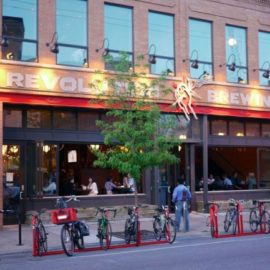
Dan and Deb Carey’s rise to success with New Glarus Brewing is storied enough to have inspired its own documentary (“Tale of the Spotted Cow“). It’s a joke among Wisconsin locals and Chicagoans alike that we Illinoisans like to fill up on the Wisconsin-only brewery whenever we wander over the border. And it’s little wonder that the main convention hall was full the morning of Deb Carey’s keynote address to Craft Brewers Conference 2018.
Carey’s talk ranged widely over a lot of subjects such that more than a few of us cast sidelong glances as if to say, “Where is she going with this?” But tangents and rabbit trails aside, the talk was still full of valuable perspective from the nation’s 26th largest brewer of beer.
“You have to focus on profit over percentages.”
I’m not sure I’m up to the task of trying to develop a through-
Profits Serve People
Early in her talk, Deb Carey emphasized that profit, distribution, growth, and other conference-room topics have never been the primary part of running a brewery business for her. “I love to be able to change the trajectory of people’s lives,” she said.
When she did start talking business, it was in terms of making the necessary decisions that allowed her to do what she and Dan really loved to do.
Pulling out of the Chicagoland market, for instance, allowed her to focus on nurturing relationships closer to home. It certainly didn’t make sense on paper to stop distributing to one of the nation’s largest beer markets, but it was taking too much energy to make it work.
In a similar way, making tons of Spotted Cow creates the margins that allow Dan Carey to brew more experimental, specialty, and limited release beers. After all, she said, “profit doesn’t come by telling people what they should be drinking.”
Beer is the People’s Beverage
Carey had little patience for dilettantes and dabblers in the beer world. She told a story of some local brewers who came to visit her on a Friday afternoon:
“They got in sometime in the afternoon and asked if I could come out and talk with them. I told them I wouldn’t finish work until five, but they were welcome to wait—which they did, drinking beers out on our patio.
“Come 5 o’clock, I went out there and said, ‘Hi, fellas.’ They said to me, ‘Deb, when does it get easier?’
“I said, ‘Easier? It’s 5 o’clock on a Friday and you’re sipping beers on my patio. Doesn’t look so bad to me.'”
Her point, of course, was that brewing is a business, and it’s the people willing to put in the hours who will be most likely to succeed at it.
Though she later called brewers artists, she insisted their product needs to be accessible to the average person. She seemed to have a sense that beer ought to appeal to a pretty broad audience.
It’s not about “craft” and “corporate,” it’s about beer: “We need to reclaim beer as the people’s beer, as America’s beer,” she insisted.
In other words, stop being so esoteric and exotic at the expense of the simple experience of enjoying a cold one.

Yeah, But …
Carey’s talk was laden with the kind of absolute and confident statements that can draw the contrarian out of the easiest-going of us, but a good critical thinker ought to at least consider where she’s coming from and see what could be learned.
On the Simplicity of Beer
For instance, on the subject of accessibility, she said, “I feel about beer the same way I feel about art: If you have to explain it, it’s probably not good.”
Lots of the Western tradition’s greatest work was not well-received at first; after all, anyone who breaks with tradition will encounter resistance from those who are comfortable with the status quo.
So, I don’t think we need to take her to mean that good beer doesn’t need descriptors or some element of consumer education. Rather, good beer should taste good, or at least compelling, even to someone who doesn’t know what they’re getting into. It shouldn’t require a brief discourse on process and ingredients to justify it tasting unusual.
There’s something to that, I think. Though of course some of your sours and funky Brett beers may be exceptions—but those aren’t going to appeal to the average drinker, anyway.
On Loyal Beer Drinkers
Beer conferences are obsessed these days with the “promiscuous drinker,” i.e., the consumer who rarely drinks the same beer twice, has no brand loyalty, and may wander freely among beer, wine, cider, and spirits, which from a business and marketing point of view are distinct categories.
Deb Carey doesn’t want to hear it. She says people ask her if there’s a loyal beer drinker anymore. “Is there a loyal beer drinker?” she responds. “I’m making 250,000 barrels in a flyover state. Are you making beer people want to drink?”
Again, we can look at the particular beer landscape when New Glarus began in 1993 that perhaps enabled them to grow into a regional brewery in a way that newcomers into a much more saturated market simply can’t do.
But, at the end of the day, it doesn’t do any good to blame the consumer, either. Your job is to make the best beer you can, beer people want to drink. If it’s good enough, and you do your job promoting it properly, you should be able to find your audience.
After all, the New Glarus story is nothing if not the story of a brewery making great beer and finding its audience.
If you’d like to talk about ways to better find and connect with your audience, contact me for a marketing plan or brand analysis.


